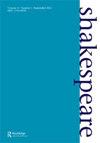Review of Shakespeare’s Much Ado About Nothing (Directed by Simon Godwin) at the Lyttleton (National Theatre), London, 10 and 30 August 2022
IF 0.2
3区 文学
0 LITERATURE, BRITISH ISLES
引用次数: 0
Abstract
Twomoments typified this production’s overwhelmingly forgiving spirit. In the final sequence, Borachio (Brandon Grace) was brought back on to embrace Margaret (Phoebe Horn) among a smiling and generally canoodling crowd, in spite of the fact that they had, between them, been instrumental in the earlier undoing and humiliation of Hero. But more profoundly (and affectingly), after her faked death and before her second wedding attempt, Hero herself (Ioanna Kimbook) entered stage left while a penitent Claudio (Eben Figueiredo) knelt, stage right, at her ‘grave’. Through her tears, she recited Sonnet 29: ‘When in disgrace with fortune and men’s eyes’. Touchingly, the sonnet acted here as a confession that, in spite of being jilted at the altar and publicly shamed by him, she still loved Claudio and contemplating him made her ‘state, / Like to the lark at break of day arising / From sullen earth, [sing] hymns at heaven’s gate’ (lines 10–12). It was an important restorative to the uncomfortable idea (probably quite acceptable to the play’s first audiences) that Hero is finally married off to a brute, in order to smooth over the public scandal caused to Leonato’s household. In this production, she was marrying him because she wanted to and, in this, she’d learned Beatrice’s lesson: ‘make another curtsy and say, “Father, as it please me”’ (2.1.49-50). Indeed, what this production did really well was to underline the agency of the play’swomen. Beatrice’s feisty contrarinesswas brilliantly personified byKatherine Parkinson. In order to underline her societal influence, the play’s closing lines about deferring the interrogation of the newly arrested Don John were given to her (in the text Bertram speaks them): ‘Think not on him till tomorrow, I’ll devise thee brave punishments for him’ (5.4.125-6). In the same vein, the change from the text’s Antonio (Leonato’s brother) to Antonia (Leonato’s wife andmother of Hero) upped the stakes and ensured that Antonia’s fierce interjections over her maligned daughter were maternal rather than merely avuncular. In the text Leonato insists, ‘I will be heard’ (5.1.109) and, later in the same scene, his caustic satire is enough to sting Claudio and Don Pedro: ‘I thank you, Princes,2022年8月10日至30日,伦敦,利特尔顿(国家剧院),莎翁剧作《无事生》(由西蒙·戈德温执导)剧评
有两个时刻代表了这部作品压倒性的宽容精神。在最后一个镜头中,波拉基奥(布兰登·格雷斯饰)被带回来拥抱玛格丽特(菲比·霍恩饰),在一群面带微笑、相互拥抱的人群中,尽管他们两人在早些时候对英雄的毁灭和羞辱起了重要作用。但更深刻(也更感人)的是,在她假死之后,在她第二次尝试结婚之前,希罗(伊安娜·金布克饰)自己进入了舞台左边,而忏悔的克劳迪奥(埃本·菲格雷多饰)跪在舞台右边,在她的“坟墓”前。她流着泪,背诵了十四行诗第29首:“被命运和男人的眼睛羞辱的时候”。令人感动的是,这首十四行诗在这里作为一种忏悔,尽管在圣坛上被抛弃,被他公开羞辱,她仍然爱着克劳迪奥,凝视着他使她“像黎明时分的云雀,从阴郁的大地升起,在天堂的门口唱赞美诗”(第10-12行)。这是一个令人不安的想法(可能对戏剧的第一批观众来说是可以接受的)的重要恢复,英雄最终嫁给了一个野蛮人,以平息给莱昂纳多家庭带来的公开丑闻。在这部作品中,她嫁给他是因为她想嫁给他,在这一点上,她学到了比阿特丽斯的教训:“再行一个屈膝礼,说,‘父亲,我很高兴’”(2.1.49-50)。事实上,这部作品真正做得很好的是强调了剧中女性的能动性。比阿特丽斯的争强好胜在凯瑟琳·帕金森身上得到了出色的体现。为了强调她的社会影响力,剧中关于推迟对新被捕的唐·约翰的审讯的结束语被交给了她(在伯特伦所说的文本中):“等到明天再想他,我会为你想出勇敢的惩罚他”(5.4.125-6)。同样,从文本的安东尼奥(莱昂纳托的兄弟)到安东尼娅(莱昂纳托的妻子和英雄的母亲)的变化增加了赌注,并确保安东尼娅对她被诽谤的女儿的激烈感叹词是母性的,而不仅仅是姑父的。在这段文字中,列奥纳多坚持说,“我会被听到的”(5.1.109),在同一场景的后面,他尖刻的讽刺足以刺痛克劳迪奥和唐·佩德罗:“谢谢你,王子们,
本文章由计算机程序翻译,如有差异,请以英文原文为准。
求助全文
约1分钟内获得全文
求助全文
来源期刊

Shakespeare
Multiple-
CiteScore
0.30
自引率
33.30%
发文量
37
期刊介绍:
Shakespeare is a major peer-reviewed journal, publishing articles drawn from the best of current international scholarship on the most recent developments in Shakespearean criticism. Its principal aim is to bridge the gap between the disciplines of Shakespeare in Performance Studies and Shakespeare in English Literature and Language. The journal builds on the existing aim of the British Shakespeare Association, to exploit the synergies between academics and performers of Shakespeare.
 求助内容:
求助内容: 应助结果提醒方式:
应助结果提醒方式:


